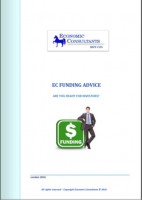INTRODUCTION
Approachi ng Investors before you are ready can spoil the only chance you may get. Below is a list of the fundamental documentation an investor will look for in a company. Professional Investors look at dozens of business plans every week, and if your proposal does not include the information below, it is unlikely they will be interested.
ng Investors before you are ready can spoil the only chance you may get. Below is a list of the fundamental documentation an investor will look for in a company. Professional Investors look at dozens of business plans every week, and if your proposal does not include the information below, it is unlikely they will be interested.
The Pitch
When you are ready to meet the investors, you will need to have an “Elevator Pitch” ready. This is a carefully planned, straight to the point and well-practiced description about your company and your goals and formed in a way that “your mother” should be able to understand and can be delivered in the time it would take to ride up an elevator.
The Executive Summary
An Executive Summary is a summary of a business plan and is designed to give the reader a taste of what the project is all about. The Executive Summary must be a part of the Business Plan and the goal of the Executive Summary is simply to work as an appetizer having the reader wanting to read the entire Business Plan. The Executive Summary should not contain classified or confidential information.
The Business Plan
A Business Plan is the written foundation in any kind of business. It describes the vision, mission, objectives, and strategies. Equally the market it is in and its financial forecasts. It has many functions, including enabling an entrepreneur to systematically evaluate the feasibility of the project, measuring success and securing external funding. The Business Plan is an accurate summary of information on all important aspects of the company, the markets and competitors; marketing and sales; board of directors, management team; and highly important; the Exit Plan.
Accounts and Achievable Projections
For investors to make an informed decision of whether to invest in your business, they obviously want to know how much your company is expecting to earn over the next three to five years. You should prepare some conservative financial projections for this purpose. Previous years’ accounts (if available) are also very useful to back up your projections and justify your valuation of the company.
The Management Team
Investors will want to see a management team in place that is not only knowledgeable about the industry and product or service, but is also capable of successfully implementing the business plan and managing and controlling the company’s operations. They should have a track record of having been involved with similar projects and having worked for other companies in the industry. The strength of your team will decide how much money you will be able to attract.
The Industry
The investor will expect you to comprehensive understanding of the industry you are in, including market size, demographics, trends, pricing strategies, accessibility, growth potential, demand for products and services, and commitment to business development. Having a degree on the subject or industry is always helpful.
The more you know – the more convincing to the Investor.
THE OFFERING
The first line in any Executive Summary or Business Plan is to give a clear idea of how much of the equity you have on offer, against what money and how much you expect the investor to make. Angel investors usually take equity in the companies they join. The amount of equity they take will depend on several factors, including the amount of capital required, the level of risk and the maturity of the company. Companies who are already profitable will have to give away less equity than a pre-sales company.
Because angel investing is high risk, the investors’ equity stake and estimated return on investment should reflect this. Angels are usually looking for businesses that have the potential to return at least ten times their original investment within a five year period.
Time and Money already Invested
A breakdown of how much money has already been invested in the business will give the investor confidence. If you have invested any of your own money in the venture or have obtained bank or government funding it will always strengthen your case. They will also want to know what this money has been spent on and what you managed to achieve with it.
Use of New Funds
Investors will want to know how their money will be spent. They might even be able to help you reduce your start-up or expansion costs. A good and well documented explanation is always very useful. You will have to be able to really convince the Investor of your needs.
The Exit Strategy
Question number one for the Investor after having taken an interest in a project is “when can I have my money back?” Presenting a reliable and convincing plan of exit is crucial. The exit strategy section of your Business Plan should also outline your long-term plans for your business. Possible exit strategies to consider are:
- Initial Public Offering
- Merger/Acquisition
- Buyout by partner in business
- Franchise the business
- Hand down the business to another family member
How long will it Take?
Finding money has always been difficult. However over time history shows that it varies a lot. Although it is very much truth in the saying that a “Good Project always finds Money”, it is wise thought to bear in mind that it can take time, much more time than expected. Therefore it is important to understand that patience and persistence is often what it takes to get success. At EC we typically are saying two to three month’s if all documentation are ready.
How to get Started!
Go to the “Funding” page. Here you will find several chapters describing our methods together with brochures explaining different options. You start by downloading the EC CIS for General Funding Requests. Just follow the instructions and send it back to us and we will contact you within a few days’ time. Best of luck!


